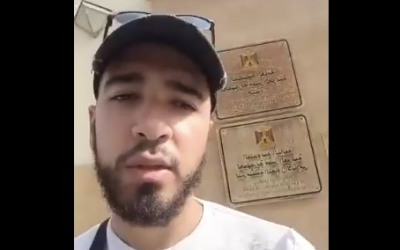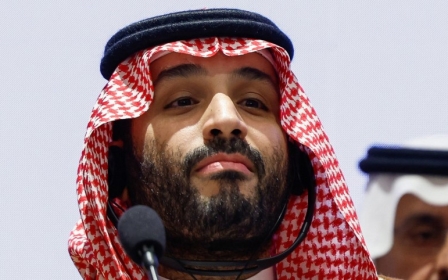Saudi producer says he was convicted over Netflix series

Saudi writer and producer Abdul Aziz al-Muzaini said he was sentenced to 13 years in prison and 13 years of travel ban two years ago by a Saudi court, on charges of promoting terrorism and homosexuality through his Netflix show and old tweets.
In a now-deleted video posted on YouTube and X (formerly Twitter) last week, and addressed to Saudi Crown Prince Mohammed bin Salman, al-Muzaini said a committee in Saudi Arabia’s audiovisual commission brought charges against him in connection with his popular animated series Masameer in 2021, shortly after it premiered on Netflix.
However, the writer and producer deleted his video a few hours after posting it and shared a post on X quoting the crown prince saying he will hold the corrupt accountable.
He also shared a post praising the head of Saudi Arabia’s General Entertainment Authority, Turki al-Sheikh.
Al-Muzaini also recently said he was overwhelmed with "kindness and good manners" during his last visit to the General Authority of Media Regulation.
New MEE newsletter: Jerusalem Dispatch
Sign up to get the latest insights and analysis on Israel-Palestine, alongside Turkey Unpacked and other MEE newsletters
"The world is fine, and the most important thing is that we put our finger on the defect and fix it, and this is what the chairman of the [authority], Dr Abdul Latif did," he said, referring to the head of the government body.
He shared another video on X in which he said he was simply addressing the Saudi people and officials, and that "problems happen" between loved ones, referring to the authorities.
While he confirmed speaking of a travel ban, he added that "if a spaceship came now and took me, and asked me 'where do you want us to drop you off'", he would choose Saudi Arabia.
In his original video, al-Muzaini said he was questioned by Saad al-Suhaimi, the chairman of the committee, who first questioned his choice of partnering with Netflix instead of working with MBC, a Saudi network.
Al-Muzaini said he told his interrogator that he had already spoken to Israa Osseiri, head of the General Authority for Audio-Visual Media, to make sure his show does not violate any laws. This, he said, prompted al-Suhaimi to message Osseiri, ordering her to stay away from the case.
According to a Royal Court letter released during the time of late Saudi King Abdullah, al-Suhaimi’s committee enjoys independence from the general audio-visual authorities.
Al-Muzaini said his interrogator told him “not to think that this is it, that there is entertainment now, there is the Riyadh season”, alluding to the recent developments in the Saudi entertainment industry and the loosening of restrictions.
“It seems he has found, through me, a person he can exert his authority over,” al-Muzaini said in the video.
Middle East Eye has contacted the Saudi government and Netflix for comment.
The accusations allegedly brought against al-Muzaini include the use of language in his series, where sentences such as “may God curse you” and “you donkey” amounted to a crime.
The final and most serious charge accuses al-Muzaini and his company, Myrcott, of supporting terrorism and homosexuality through their series Masameer.
According to al-Muzaini, his accusers interpreted the first episode of his show, which mocks the Islamic State group, as an implicit endorsement of the organisation.
Al-Suhaimi then brought forward a series of tweets made by al-Muzaini between 2010 and 2014 which were used to bring other charges against him.
Saudi Arabia’s Public Prosecution service had initially requested a 25-year imprisonment followed by a 25-year travel ban, which were reduced to 13 years each by the country’s Terrorism Court last month, according to the producer. The case is now being heard before the country's Supreme Court, according to al-Muzaini.
Al-Muzaini said that prior to the ruling, he was reassured by informed people that the case was unworthy and only needed to be solved through bureaucracy. He was also told that al-Suhaimi, along with everyone who signed the accusations against him, were fired, when al-Suhaimi was simply reassigned to another committee. MEE was unable to independently confirm the allegations.
Al-Muzaini’s case comes as Saudi Arabia faces criticism from many human rights organisations over its alleged use of the entertainment sector to try to lessen its reputation as an authoritarian regime.
Middle East Eye delivers independent and unrivalled coverage and analysis of the Middle East, North Africa and beyond. To learn more about republishing this content and the associated fees, please fill out this form. More about MEE can be found here.





